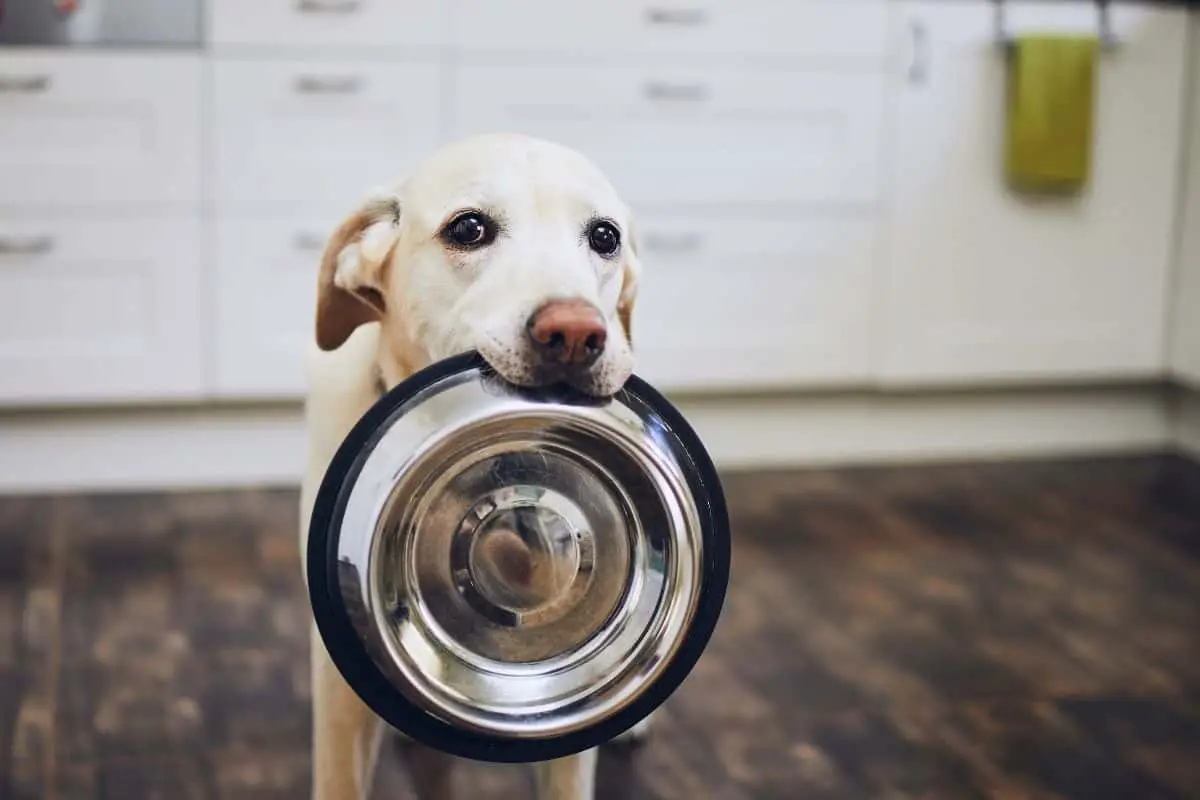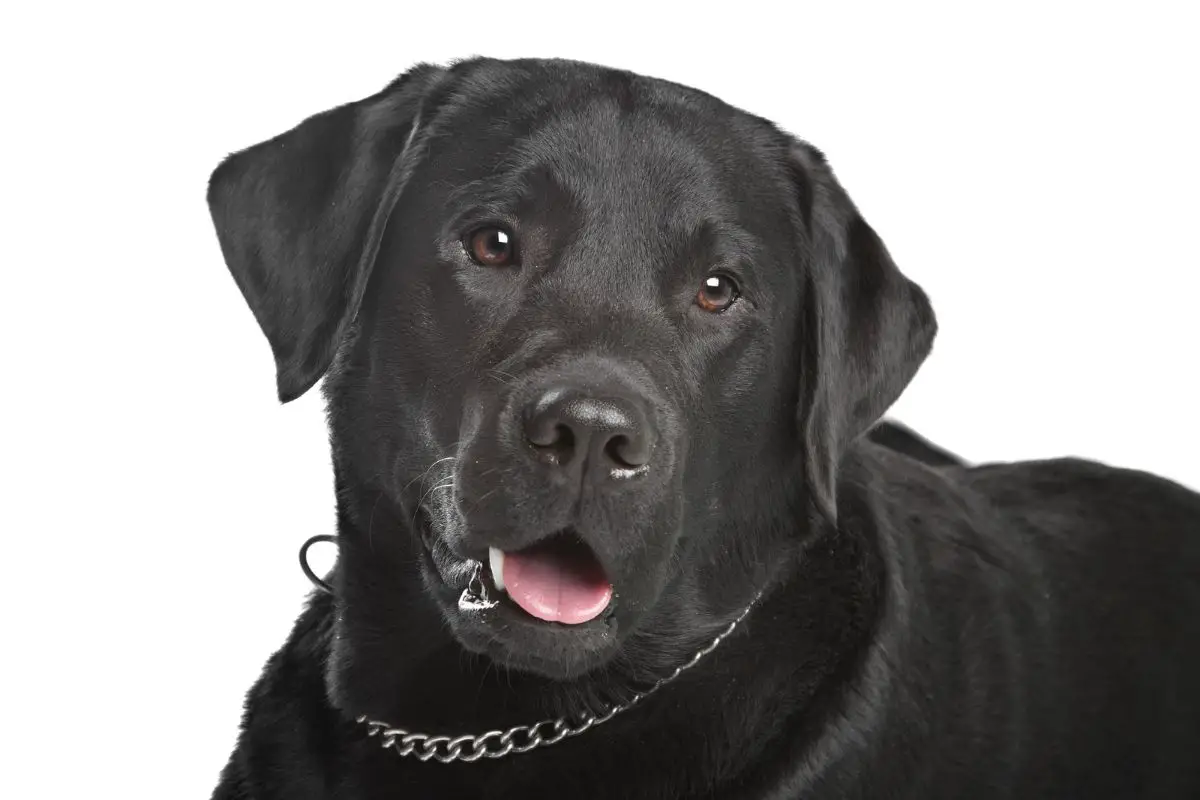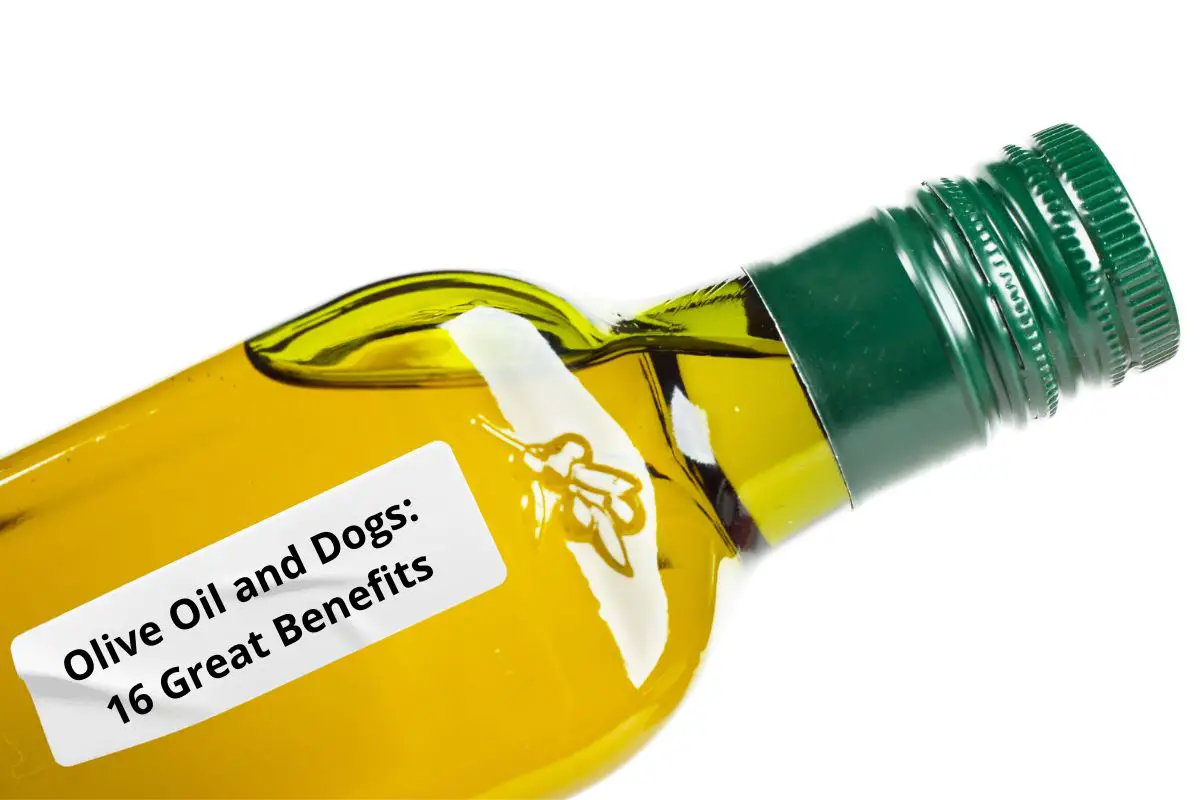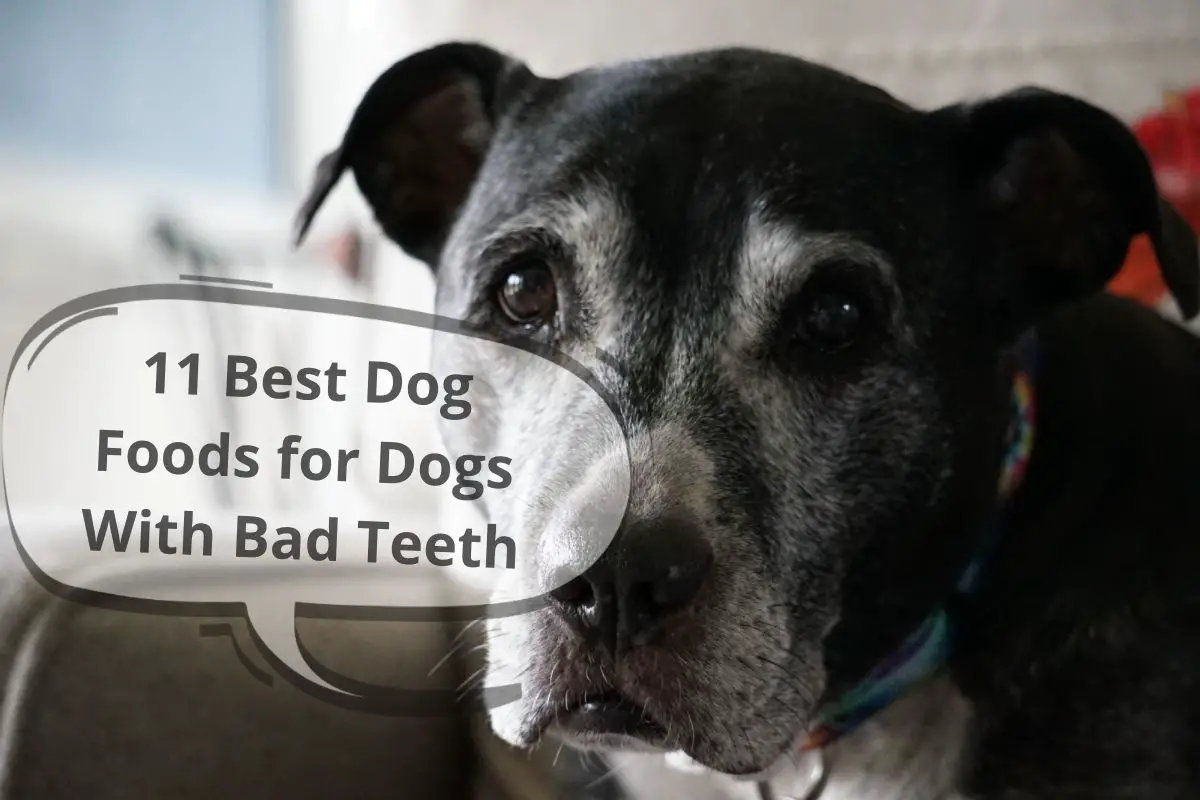This post contains affiliate links.
When you go to feed your dog only to discover you’re out of dog food, you may wonder what foods you can give your furry friend. Turns out, there are plenty of good options you likely have on hand right now. However, it’s also important to know which foods are not okay to feed your dog, as the wrong ones can cause serious health issues.
If you’re out of dog food, other foods a dog can eat are vegetables and fruits, such as carrots, green peas, and apples. Dogs can also eat chicken, eggs, salmon, pumpkin, peanut butter, and oatmeal. Cooked foods should be prepared without spices, like garlic and onion, as they’re harmful to dogs.
This article explains some safe and healthy foods you can give your dog in emergencies. It also discusses some foods you should never give to dogs.
Table of Contents
Foods Dogs Can Eat
Here’s a list of foods that dogs can eat without any problems.
Carrots
Carrots are as healthy for your dog as they are for you. These vegetables contain high amounts of beta-carotene, a vitamin A precursor proven to enhance vision in humans and dogs when converted to vitamin A in the body. Carrots contain significant amounts of Vitamin B and K, which help keep your canine strong and active.
Additionally, carrots contain high levels of fiber, which bulks up your pet’s stool and prevents constipation. Carrots can also improve your dog’s dental health.
Dogs can eat raw or cooked carrots; however, raw carrots should be cut into small chunks or sticks to prevent choking, especially for younger dogs.
Green Beans
Green beans are your go-to if your dog is overweight and in dire need of healthy and low-calorie food. These green vegetables are packed with beneficial vitamins and minerals, whether boiled, chopped, or raw.
Some of the most abundant vitamins in green beans are B6, A, C, and K. Vitamin A helps to ensure good skin and foster eyesight and vitamin C builds up the immune system, making it a great choice if your dog is prone to illness. Meanwhile, vitamin K is vital in the blood clotting process and ensures healthy blood composition.
Additionally, green beans contain iron (an essential element in blood production), protein (good for bodybuilding), and calcium (good for bone development). This makes this vegetable especially beneficial for younger dogs.
Like carrots, green beans help to prevent constipation because of their high fiber content. They can also be eaten either raw or cooked; however, green beans should be cooked with no spices, and larger beans should be cut into small pieces to avoid choking.
Certain Types of Fish
While dogs can consume fish, not all kinds of fish are recommended. The safest types of fish for dogs are the short-lived fish species, including:
- Salmon
- Herring
- Whitefish
- Ocean whitefish
- Lake whitefish
- Walleye
- Cod
- Flounder
- Catfish
- Arctic char
These types of fish are generally safe for your dog to eat and are rich in proteins and omega-3 fatty acids, which help maintain healthy-looking skin and coat. Be sure to cook the fish properly, as raw and undercooked fish can carry harmful bacteria like salmonella and listeria in the skin and muscles.
It’s best to exclude any seasoning when cooking fish, and avoid frying, as fats in the cooking oil can trigger gastrointestinal problems like pancreatitis. Also, thoroughly debone the fish before feeding it to your dog. Fish bones are small and can easily get stuck in the mouth, throat, and intestines of your canine.
Chicken
Chicken is another great food option for dogs that’s just as healthy and safe as fish. Chicken contains lean protein and supplies your dog with a good deal of energy. It also has considerable amounts of omega-6 fatty acids, which keep your canine’s skin healthy.
Additionally, chicken contains B vitamins that help prevent infections and contribute to several processes in the body. Amino acids – the foundations upon which proteins grow – are also available in chicken.
When served correctly, chicken can be of immense benefit to your canine buddy.
Like fish, chicken cooked for your dog should not be seasoned, rather, cooked plain. To bring in additional flavor, add some carrots and green peas while cooking. Also, don’t fry chicken meant for dogs, and remember to remove any bones before serving. Chicken bones are even more dangerous than fish bones. They’re larger and tougher and can injure the throat when swallowed.
Eggs
Eggs are great for dogs as they contain many vitamins, proteins, amino, and fatty acids. And while it’s not the tastiest treat (and can be somewhat tricky to make), it’s safe to feed dogs grounded eggshells, as the shells are a great source of calcium to support strong bones and teeth.
Raw and undercooked eggs often contain salmonella, so be sure to cook eggs thoroughly before serving them to your dog. It doesn’t matter whether it’s scrambled or hardboiled, as long as it gets appropriately cooked and without seasoning, butter, oils, or spice.
Generally, it’s safe to give dogs one egg per day; your vet can tell you if your dog should have more. It’s also best to source eggs from a free-range organic farm to ensure the eggs have no added chemicals inside.
Oatmeal
This popular breakfast food packs a ton of nutrients, vitamins, and minerals, including iron for blood, calcium for bones and teeth, and vitamin A for vision. Additionally, Vitamin B in oatmeal helps maintain a shiny and healthy coat, and Omega-6 fatty acids help the skin remain strong and healthy.
Oatmeal also has plenty of dietary fiber, which we’ve already discussed aids in digestion and prevents constipation and diarrhea.
Don’t give dogs raw oatmeal, and avoid other additives such as milk or butter. It’s best to prepare your dog’s oatmeal with plain water only. Also, stick to whole grain options, as they have better nutritional value than processed types. If you must use pre-packaged oats, make sure they don’t contain artificial sweeteners.
Pumpkin
Pumpkins are a superfood for dogs, due to high amounts of fiber, vitamins, and minerals. What’s more, every part of a pumpkin is safe for consumption – from the skin, to the flesh, even the seeds.
Pumpkin seeds contain certain oils that improve the health of your dog’s urinary tract. The seeds are also believed to contain a natural deworming agent known as cucurbitacin. The skin and flesh contain a high fiber content that aids digestion and bulks up stool, thus effectively tackling diarrhea.
Another great thing about pumpkin is it’s a low-calorie food, making it an ideal choice for dogs on a diet. Dogs may eat canned pumpkin, which offers more nutrition per serving because of the reduced water content. However, like other foods, spices, oils, and sweeteners should be avoided.
Sweet Potatoes
The same things that make sweet potatoes good for humans make them good for dogs. These sweet tubers have low fat and contain iron, potassium, calcium, vitamins A, B6, and C, which help the immune system.
Sweet potatoes are rich in fiber and deliver the same benefits as carrots and green beans. Unlike these vegetables, however, potatoes shouldn’t be served to dogs raw. Raw potatoes are tough to chew and can cause internal blockages and stomach upsets.
Cook potatoes by boiling, steaming, and baking, and don’t use any seasoning, oils, or butter. Also, remove the skin, as it’s difficult to digest.
Peanut Butter
Unless your pooch is allergic to nuts, organic peanut butter is a fantastic inclusion in its diet. It contains a generous amount of vitamins, including B and E.
Vitamin E fortifies the immune system, and B maintains a shiny coat. Best of all, the unhealthy fats in peanut butter don’t affect a dog’s heart. It’s a great treat that furnishes your dog with energy and vitality.
Homemade peanut butter is the best bet, but if that’s not available, choose a brand that doesn’t contain artificial sweeteners or salt.
Avoid feeding excessive amounts of peanut butter to your dog, as it could lead to obesity and pancreatitis. Talk to your vet about the appropriate amount of peanut butter to add to your dog’s diet.
White Rice
Rice is one of the most widely eaten foods globally and a common ingredient in some commercial dog foods.
White rice is mainly composed of carbohydrates, which is an important source of energy. Rice also contains proteins and minerals like calcium. Many dog owners turn to white rice when their pet is suffering diarrhea because rice is easy to digest and also contains some fiber.
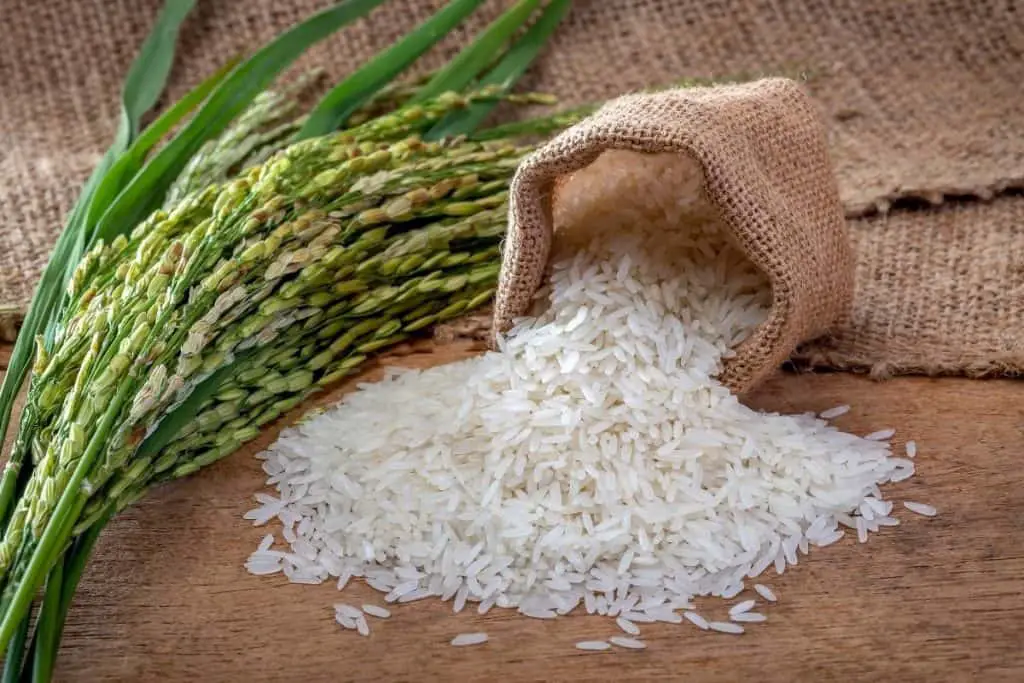
Boil rice in water without any seasoning or spices. When the rice is soft enough, strain it and collect the water in another dish. Rice water is another great treat for dogs, especially older dogs, who will benefit from an energy boost.
However, white rice can cause blood sugar levels to rise, so avoid offering too much of it. Don’t offer it consistently, either, especially if your dog is diabetic.
PopCorn
Dogs may be given some popcorn, as long as it is unsalted and unbuttered. Plain popcorn is a good treat for dogs, as it contains fiber and carbohydrates for energy.
When feeding dogs popcorn, ensure no unpopped kernels are mixed in, as these aren’t easy to digest and can cause stomach upsets.
Other Foods That Dogs Can Eat
The ten foods discussed above are some of the healthiest your dog can eat. However, there are other notable mentions, each with unique health benefits, such as:
- Blueberries, blackberries, raspberries, and strawberries: These are soft berries and are easy to chew, so there’s no risk of choking, and they don’t contain any toxic compounds.
- Green peas: Green peas have much the same benefits for dogs as green beans.
- Small servings of yogurt: yogurt contains calcium and proteins, as well as probiotics which help digestion.
Foods Dogs Can’t Eat
There are numerous adverse effects of feeding your dog the wrong foods. Science has linked certain foods to impaired immune function, skin problems, and multiple illnesses like anemia, pancreatitis, and diarrhea. Here’s a list of foods you should never give your dog.
Alliums (Onions, Chives and Garlic)
Onions, chives, leeks, and garlic – all members of the Allium family of plants – are not advisable for your dog. All forms of such plants, whether dehydrated, raw, or cooked can be potentially poisonous and cause nausea, abdominal pains, and diarrhea, resulting in anemia, increased heart rate, even death.
It’s not clear what amount of these herbs is fatal for dogs, but the effect will show with time and at the very least, cause continued consumption. Thus, it’s recommended to not feed them to dogs or use them to prepare meals for dogs.
Some Types of Fish
While dogs can eat short-lived fish like walleye and herring, don’t feed them larger, longer-lived fish species, including:
- Swordfish
- King mackerel
- Shark
- Canned tuna
These fish species would usually have accumulated high levels of heavy metals like lead and mercury in their systems before their capture. Additionally, there will be an equally high level of bacteria and parasites living in their skin and organs. As such, you risk not only metal toxicity but also gastrointestinal problems caused by parasites.
Chocolate
Cocoa, the primary ingredient in chocolate, contains theobromine. While a mild stimulant in humans, this can be lethal for dogs because their bodies process it slower.
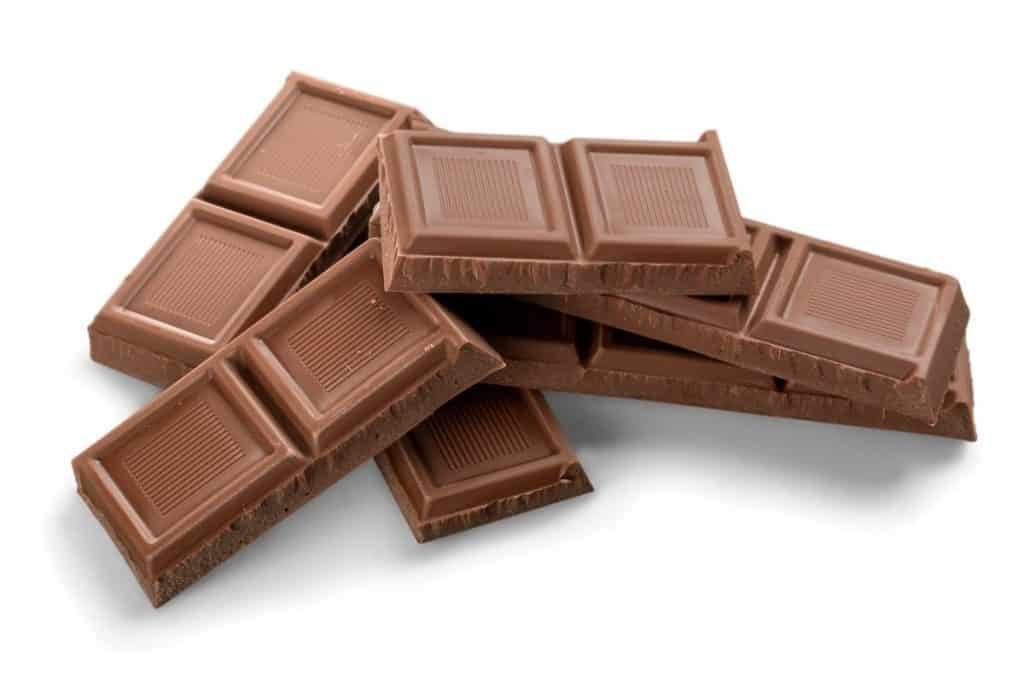
Theobromine mainly affects the kidneys, gut, and respiratory, cardiovascular, and central nervous systems. Symptoms of potential theobromine poisoning to watch out for include diarrhea, vomiting, seizures, drunken gait, and hyperactivity. Additionally, there’s some caffeine in chocolate, which makes it doubly dangerous for dogs.
The most lethal varieties are cocoa powder and plain chocolate; Less than 100g of either can be fatal for average-sized dogs. Other varieties, like milk chocolate and white chocolate, are less dangerous, so if small amounts are accidentally consumed, it shouldn’t be too harmful.
Caffeinated Foods
Caffeine is a stimulant with much of the same symptoms and effects as theobromine in chocolate.
Pets are more sensitive to the effects of caffeine than humans. So while sneaking a few laps out of your morning joe may not be a problem, allowing one or two whole cups of coffee to be consumed is dangerous for your dog.
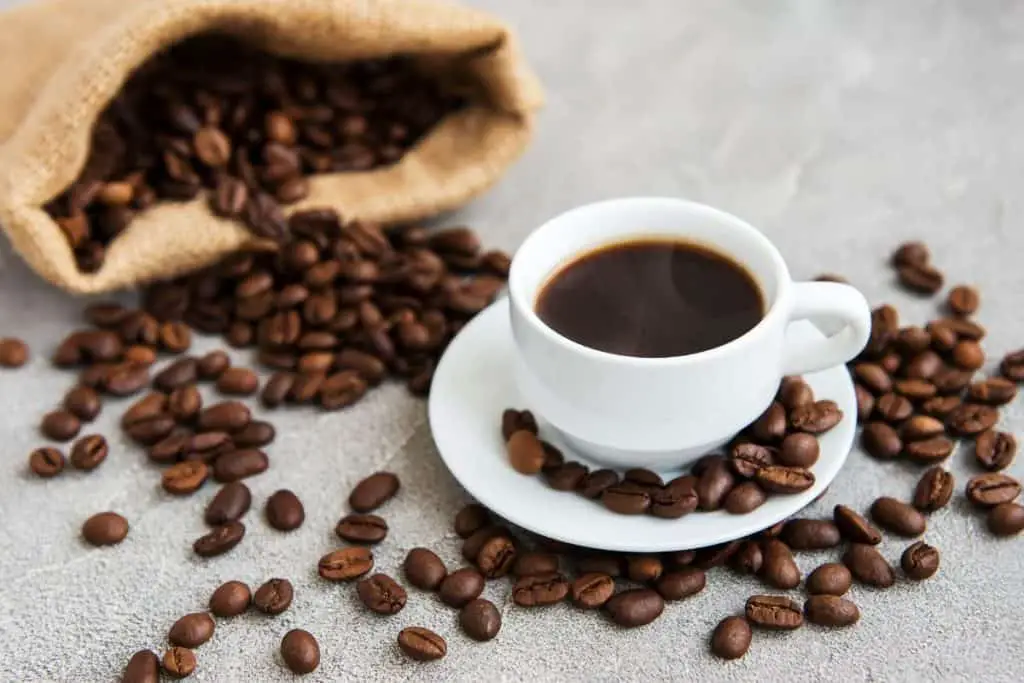
The most common source of caffeine is coffee. Still, teas, soda, energy drinks, and over-the-counter drugs also contain caffeine, so keep your dog away from these.
Grapes & Raisins
The ASPCA (Animal Poison Control Center) reported receiving over 3000 calls for grape poisoning in 2016. Unfortunately, studies have not yet discovered the harmful substance in grapes and raisins; however, it has been determined that grapes and raisins can lead to acute kidney failure.
Presently, there is no known lethal dose for either of these fruits, and poisoning depends on individual dogs. Nonetheless, it’s best to avoid even small quantities of either fruit, especially for dogs with underlying medical conditions.
Alcohol
Alcohol isn’t a problem only in beverage form. Some people inadvertently give dogs alcohol not realizing foods like fermenting bread dough and overripe fruit contain ethanol.
Depending on the size and weight of the dog, consuming even the smallest quantity of alcoholic foods and beverages may lead to diarrhea, vomiting, tremors, difficulty breathing, blood changes, impaired coordination, failure of the central nervous system, and possibly death. As such, keep all beverages and foodstuff containing alcohol away from toy breeds like the chihuahua, Shih Tzu, pug, etc.
Macadamia Nuts
Macadamia nuts aren’t as popular as peanuts or walnuts. They’re usually added to pastries like cakes, cookies, and muffins. And while they’re safe for humans and even cats, dogs are not as lucky.
Like grapes, veterinarians and researchers are yet to identify the toxin in macadamia nuts or a lethal dosage. However, even small amounts can be dangerous for dogs, leading to symptoms like weak hind legs, depression, muscle stiffness, and elevated heart rate.
Cooked Bones
Contrary to popular belief, bones, particularly cooked bones, are not safe for dogs to eat. The cooking process makes bone brittle, which breaks easily as the dog chews on it, leading to a host of potential problems, including:
- Broken teeth
- Injured tongue and gums
- constipation
- Rectal bleeding
- Windpipe, esophagus, and intestinal blockages
Rotten or Mold-Infested Foods
Eating mold-infested foods has adverse effects not only on human health, but also your dog’s. Should your dog eat foods infested with mold, he may suffer severe problems like weakness, diarrhea, labored breathing, bad vision, and abdominal pains. Additionally, some rotten fruits produce ethanol, and eating these can result in alcohol poisoning.
Keep leftovers out of your dog’s reach and teach him not to go sourcing from the waste bin.
Yeast Dough
If a dog eats yeast dough, the heat in the dog’s stomach encourages the yeast to keep rising. The expanded dough can cause bloating, abdominal pains, and intestinal blockages. In extreme cases, such blockages can be life-threatening and will require surgery to treat.
Furthermore, as yeast ferments in the gut, it produces alcohol, which can lead to alcohol poisoning.
Xylitol
Xylitol is an artificial sweetener found in many diet foods, diabetic canes, and sugar-free gums. While considered safe and perhaps healthier than sugar for humans, that’s far from the case for dogs.
When dogs ingest xylitol, it’s quickly absorbed in the bloodstream, triggering insulin release from the pancreas. The release of insulin can result in hypoglycemia, which is the rapid decrease in blood sugar levels. A small amount of xylitol can cause hypoglycemia, while about 10g can lead to liver failure.
Therefore, avoid leaving chewing gum where your dog can reach it, and ensure there’s no xylitol in foods your dog enjoys, such as peanut butter.
Corn on the Cob
Dogs should not be offered corn on the cob, as there’s a high risk of choking and intestinal blockages if sizable chunks of the cob are swallowed. When this happens, dogs tend to vomit more often. They will also experience a loss of appetite and strength, and suffer from dehydration, diarrhea, and abdominal discomfort.
Other Foods Dogs Shouldn’t Eat
There are several other toxic foods besides those described above, and this list includes:
- Avocado: Persin in avocados can cause vomiting and diarrhea.
- Unripe tomatoes: Unripe tomatoes contain some amount of tomatine which can cause gastrointestinal upset
- Dairy products: Dairy can be difficult for dogs to digest
- Nutmeg: Myristicin in nutmeg can cause gastrointestinal upset (in humans, too)
Final Thoughts
If you ever find yourself without dog food, and it’s too late to get some, you can turn to some safe human foods, including;
- Carrots
- Oatmeal
- Pumpkin
- Green beans
- Eggs
- Yogurt
- Peanut butter
- Sweet potatoes
- Chicken
- Short-lived fish, such as salmon, flounder, catfish, walleye, herring, and whitefish
These foods are generally safe for dogs and can serve in emergencies; however, they shouldn’t be used as replacements for actual dog food. Remember not to add seasoning when preparing food for dogs, and always consult your vet if you want to incorporate any food permanently into your dog’s diet.
If you’re even more interested in what dogs can eat instead of dog food? Then you should also take a look at these articles that I wrote:
- Is Bologna a Good Dog Treat? (We Find Out)
- Can Dogs Eat Beef Jerky? (We Ask the Experts)
- Can Dogs Eat Chestnuts? (Is it Safe?)
- Can Dogs Eat Mac and Cheese? We Find Out
- Can Dogs Eat Cilantro? (We Find Out)
- Can Dogs Eat Chicken Feet? (We Ask the Experts)
- Can Dogs Eat Caramel? (We Ask the Experts)
- Can Dogs Eat Raw Pork? (We Ask the Experts)
Sources
- PetMd: Do Carrots Really Improve Vision for You, Your Dog?
- ASPCA: Leah’s Close Call: A Handful of Grapes Nearly Cost One Dog Her Life
- AKC: Can Dogs Eat Onions?
- AVMA: Top 10 reasons pets visit veterinarians
- AKC: Can Dogs Eat Eggs?
- The Spruce: Human Foods That Are Toxic to Dogs
- The Spruce: Can Dogs Eat Oatmeal?
- Modern Dog Magazine: 10 “People” Foods for Dogs
- USDA: Rice, White, Short-Grained, Raw, Unenriched
- Harvard: Eating White Rice Regularly May Raise Type 2 Diabetes Risk
- FDA: Fish and Fishery Products Hazards and Controls Guidance
- FDA: Paws Off Xylitol; It’s Dangerous for Dogs
- VCA Hospitals: Xylitol Toxicity in Dogs
- NCBI: Chocolate Poisoning
- VCA Hospitals: Grape, Raisin, and Currant Poisoning in Dogs
- Animal Poison Control Alert: Macadamia Nuts are Toxic to Dogs
- NCBI: Nutmeg (Myristicin) Poisoning
Mrdogfood.com is a participant in the Amazon Services LLC Associates Program, an affiliate advertising program designed to provide a means for sites to earn advertising fees by advertising and linking to Amazon.com. We also participate in other affiliate programs which compensate us for referring traffic.

